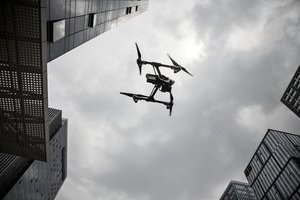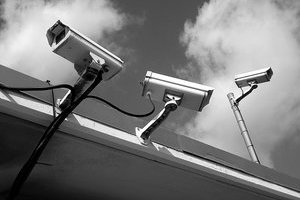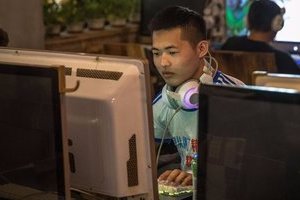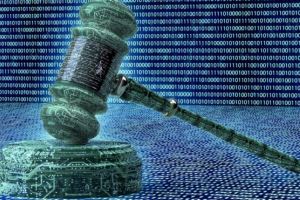U.S. weighs curbs on Сhinese telecom firms over national-security concerns
 The Trump administration is considering executive action that would restrict some Chinese companies’ ability to sell telecommunications equipment in the U.S., based on national-security concerns, said several people familiar with the matter.
The Trump administration is considering executive action that would restrict some Chinese companies’ ability to sell telecommunications equipment in the U.S., based on national-security concerns, said several people familiar with the matter.
The move, if it happens, would represent a significant escalation of a growing feud between the U.S. and China over tech and telecommunications. The affected firms likely would include Huawei Technologies Co. and ZTE Corp. , two of the world’s leading telecommunications equipment makers. They have found themselves increasingly in an international crossfire.
Read moreApple moves to store iCloud keys in China, raising human rights fears
 Last month, Apple announced that it would hand over management of its Chinese iCloud data to a local, state-owned firm in China called Cloud Big Data Industrial Development Co at the end of February in order to comply with new laws.
Last month, Apple announced that it would hand over management of its Chinese iCloud data to a local, state-owned firm in China called Cloud Big Data Industrial Development Co at the end of February in order to comply with new laws.
Now, experts are reporting that Apple will also hold iCloud encryption keys for Chinese users in China itself, raising new concerns about government access. The new policy does not affect any iCloud users outside of China. Compliance means Chinese authorities will have easier access to user data that’s stored in Apple’s iCloud service, especially now that, for the first time, Apple will store the keys for Chinese iClouds within China.
Read moreChinese online retailer JD plans to open hundreds of unmanned shops, ahead of Amazon
 Chinese online retailer JD.com has beaten Amazon to the next stage of the shopping revolution by announcing plans to open hundreds of "unmanned" convenience stores. The shops have already been trialled with JD's 10,000 employees at headquarters in Beijing and use facial and recognition technology to register payment and product identity, meaning that customers do not have to wait in a checkout line.
Chinese online retailer JD.com has beaten Amazon to the next stage of the shopping revolution by announcing plans to open hundreds of "unmanned" convenience stores. The shops have already been trialled with JD's 10,000 employees at headquarters in Beijing and use facial and recognition technology to register payment and product identity, meaning that customers do not have to wait in a checkout line.
JD explained that cameras on the ceilings of the stores can recognize customers’ movement and generate heat maps of their activity to monitor customer traffic flow, product selection and customer preferences, which helps store owners to stock efficiently.
Read moreChina’s CCTV surveillance network took just 7 minutes to capture BBC reporter
 It took Chinese authorities just seven minutes to locate and apprehend BBC reporter John Sudworth using its powerful network of CCTV camera and facial recognition technology. This wasn’t a case of a member of the media being forcibly removed from the country.
It took Chinese authorities just seven minutes to locate and apprehend BBC reporter John Sudworth using its powerful network of CCTV camera and facial recognition technology. This wasn’t a case of a member of the media being forcibly removed from the country.
The chase was a stunt set up to illustrate just how powerful and effective the Chinese government’s surveillance system can be. It’s a stark example of the type of monitoring that China has invested heavily in over recent years with the aim of helping police do their job more efficiently. Such systems are also used in private organizations, for example to monitor workers and processes in factories.
Read moreDrone maker DJI may be sending data to China
 D.J.I., the popular drone maker, stands as a symbol of China’s growing technology prowess. Its propeller-powered machines dominate global markets and buzz regularly over beaches, cityscapes at sunset and increasingly, power plants and government installations.
D.J.I., the popular drone maker, stands as a symbol of China’s growing technology prowess. Its propeller-powered machines dominate global markets and buzz regularly over beaches, cityscapes at sunset and increasingly, power plants and government installations.
Now D.J.I. is fighting a claim by one United States government office that its commercial drones and software may be sending sensitive information about American infrastructure back to China, in the latest clash over the power of data in the growing technological rivalry between the two countries.
Read moreSkynet in China: Real-life 'Person of Interest' spying in real time
 If you’ve seen the TV series "Person of Interest," then you might recall that during the opening narration from Season One, Harold Finch would say, “You are being watched. The government has a secret system, a machine that spies on you every hour of every day. I know because I built it. I designed the machine to detect acts of terror but it sees everything.”
If you’ve seen the TV series "Person of Interest," then you might recall that during the opening narration from Season One, Harold Finch would say, “You are being watched. The government has a secret system, a machine that spies on you every hour of every day. I know because I built it. I designed the machine to detect acts of terror but it sees everything.”
I was reminded of that when I saw a GIF that appears as if it could be a Chinese version of the show. It is a CCTV clip showing current surveillance in China. Thanks to artificial intelligence, China’s sadly named “Sky Net” system demonstrates just how creepy real-time surveillance can be.
Read moreChina is said to ban bitcoin exchanges while allowing OTC
 China plans to ban trading of bitcoin and other virtual currencies on domestic exchanges, dealing another blow to the $150 billion cryptocurrency market after the country outlawed initial coin offerings last week.
China plans to ban trading of bitcoin and other virtual currencies on domestic exchanges, dealing another blow to the $150 billion cryptocurrency market after the country outlawed initial coin offerings last week.
The ban will only apply to trading of cryptocurrencies on exchanges, according to people familiar with the matter, who asked not to be named because the information is private. Authorities don’t have plans to stop over-the-counter transactions, the people said. China’s central bank said it couldn’t immediately comment. Bitcoin slumped on Friday after Caixin magazine reported China’s plans, capping the virtual currency’s biggest weekly retreat in nearly two months.
Read moreChina's cybersecurity law grants government 'unprecedented' control over foreign tech
 China's new cybersecurity law will enable its government to discover potential security vulnerabilities of any company doing business in the country, threat intelligence firm Recorded Future warns.
China's new cybersecurity law will enable its government to discover potential security vulnerabilities of any company doing business in the country, threat intelligence firm Recorded Future warns.
The law grants the China Information Technology Evaluation Center, an office in the Ministry of State Security, the power to request source code and other intellectual property of tech suppliers operating in the country. Information gleaned might easily be exploited by CNITSEC in furtherance of its intelligence operations. Director of strategic threat development at the firm reckons the measures place companies between a rock and a hard place.
Read moreChinese internet users will no longer be able to post online anonymously
 More bad news for folks in China. Chinese internet users will no longer be able to post comments online anonymously as of Oct. 1. The new ruling is the latest in the government's move to tighten control over internet usage in the country.
More bad news for folks in China. Chinese internet users will no longer be able to post comments online anonymously as of Oct. 1. The new ruling is the latest in the government's move to tighten control over internet usage in the country.
Sites like social networks and discussion forums will have to verify the real identities of registered users before they can be allowed to post anything on their platforms. Comments on news stories will also have to be reviewed by the website before they can appear online. For example, Zhihu, a Quora-like discussion site, has already started asking users to verify their identities.
Read moreChinese 'cyber-court' launched for online cases
 China has launched a digital "cyber-court" to help deal with a rise in the number of internet-related claims.
China has launched a digital "cyber-court" to help deal with a rise in the number of internet-related claims.
The Hangzhou Internet Court opened on Friday and heard its first case - a copyright infringement dispute between an online writer and a web company. Legal agents in Hangzhou and Beijing accessed the court via their computers and the trial lasted 20 minutes. The court's focus will be civil cases, including online shopping disputes. Judges were sworn in and the first case was presented on a large screen in the courtroom. Defendants and plaintiffs appear before the judge not in person, but via video-chat.
Read moreAxarhöfði 14,
110 Reykjavik, Iceland















